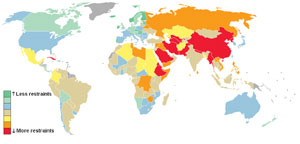 Most of us live our lives by years. We mark the passage of time with birthdays, anniversaries, and religious and secular holidays that come up each time the calendar cycles. Weeks follow weeks, months drift by, and New Year-whether Nepali, Newar, Nauroz, Lhosar, or Julian-is always a time of celebration. Another trip around the sun for our bruised planet and our stressed selves.
Most of us live our lives by years. We mark the passage of time with birthdays, anniversaries, and religious and secular holidays that come up each time the calendar cycles. Weeks follow weeks, months drift by, and New Year-whether Nepali, Newar, Nauroz, Lhosar, or Julian-is always a time of celebration. Another trip around the sun for our bruised planet and our stressed selves.
But a friend of mine is currently marking his mental calendar in much smaller increments: day by day, hours, minutes, probably even seconds. His name is Alan Johnston.
On 12 March 2007, Alan was driving home from his job as the BBC correspondent in Gaza City, Palestine. He was almost at the end of a three-year assignment reporting on the violence, politics, and tragedies of that tiny strip of embattled territory. He'd covered Israeli forces coming and going, shelling and bombing, and Gaza militants firing back. Mostly he'd got to know the Palestinian people and the rest of us knew them through him.
Subhuman scum with guns picked up Alan as he drove towards his apartment that day, and they whisked him off into the darkness of captivity-probably a concrete box of a room in an obscure apartment block somewhere, either underground or with blacked-out windows. Until earlier this month, no public demands had been made by people purporting to be his abductors. Now they say they want militant prisoners released from UK jails. Reportedly, they also want money and weapons.
Those demands-whether from his actual kidnappers or not-are immaterial. What matters is the human plight of Alan Johnston, alone in a dark room, uncertain of his fate, counting off the seconds, minutes, and hours, living day to day, perhaps aware of the momentous occasions that pass by with the march of time.
Thursday, 10 May, was his 60th day in captivity. The week before was World Press Freedom Day and there were rallies by Alan's colleagues around the world, demanding his safe and immediate release. His 45th birthday was on 17 May and on Sunday he'll have been in captivity 70 days. Unless he's let go, which could happen at any time. Or not. The hours tick by in the darkness of his prison.
Alan's kidnapping is about the larger issue of press freedom, the rights of media workers everywhere to seek and report the truth. We have ways of dealing with governments who suppress information. In democracies, we take them to task or court and sometimes we win. Authoritarians are vilified in the media and by brave NGOs like Amnesty International and the Committee to Protect Journalists.
What do we do about faceless militants misguided enough to think that they achieve even an iota of their twisted agendas by depriving an innocent of his freedom. We hold rallies, we try to talk to them through middlemen, we suffer through our powerlessness.
Nepal has more than its share of nasties who cross the line and harass media workers. We've seen it recently in the tarai unrest and all too often during the civil war. Jitman Basnet's ordeal at the hands of the army; the murder of Gyanendra Khadka in 2003 by Maoists. There are many others. No one has paid any price for these atrocities and, probably, no one will.
I can only ask Nepali Times readers to join me in calling for Alan Johnston's release, and for freedom of any other incarcerated media worker anywhere, in Iraq, Afghanistan, or Congo. Let them go. Let the information flow. To sign an online petition from 70 countries demanding Alan's release, go to http://news.bbc.co.uk/2/hi/middle_east/6518185.stm
A free media is the best weapon a free society can have. Free Alan Johnston now.



